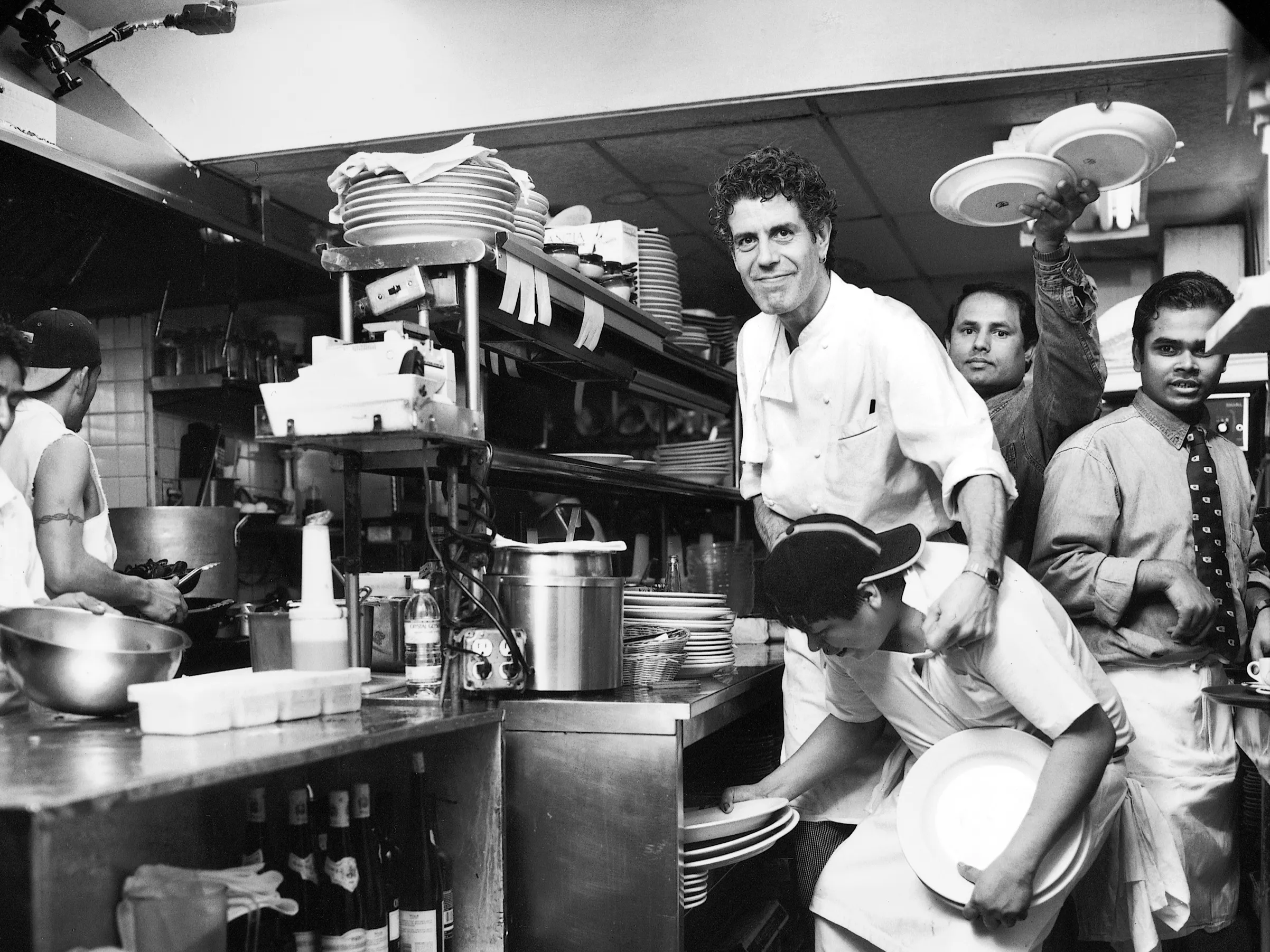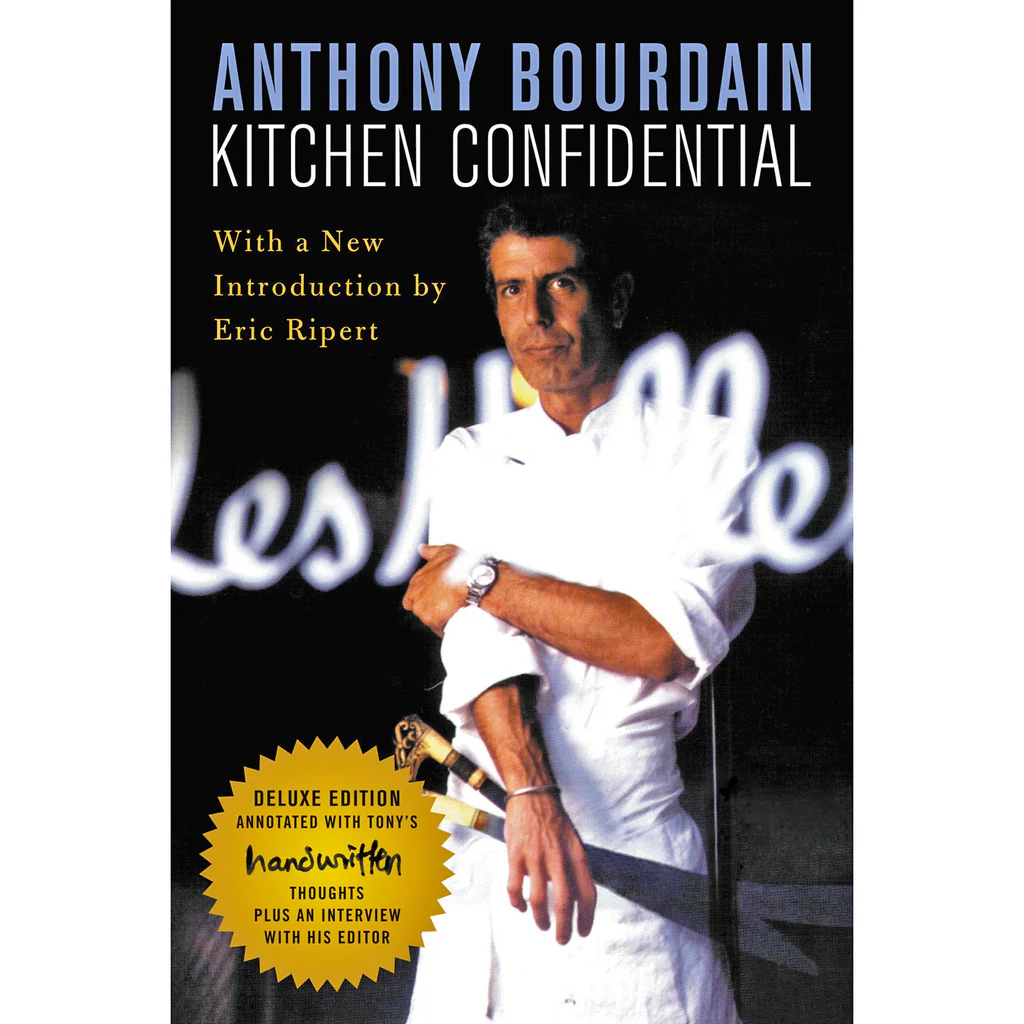Kitchen Confidential: The Exposé That Transformed Our View of Restaurant Culture
- For The Writers | Official
- Dec 29, 2024
- 7 min read
Updated: Mar 18
Exposing the High-Pressure, Chaotic, Unseen Realities of Life in Professional Kitchens
In 2000, a brash, gritty memoir titled Kitchen Confidential: Adventures in the Culinary Underbelly hit shelves and forever changed the way we think about food, restaurants, and the people behind the scenes. Written by Anthony Bourdain, a relatively unknown chef at the time, the book didn’t just reveal the high-pressure, chaotic, and often unsavory realities of professional kitchens—it redefined what a culinary memoir could be. What made it groundbreaking wasn’t just the content but the unapologetic, razor-sharp voice Bourdain brought to the page, turning Kitchen Confidential into an instant classic.
For the publishing world, this was an iconic move. At a time when food writing leaned heavily on polished recipes, elegant dining experiences, and sanitized portrayals of culinary culture, Kitchen Confidential shattered the mold. It introduced a genre that was raw, unfiltered, and unabashedly honest. Bourdain’s memoir wasn’t about the glamorous side of food—it was about the grit, the grind, and the deeply flawed, colorful characters who lived and breathed the restaurant industry. His voice—a mix of irreverence, dark humor, and poetic insight—stood out in a market that had rarely celebrated the underbelly of culinary life.
This authenticity was a gamble for publishers but proved to be exactly what readers were hungry for. Bourdain’s no-holds-barred storytelling didn’t just sell books—it ignited conversations about the realities of the restaurant world, inspiring a wave of memoirs and essays that followed in its wake. It also expanded the scope of food writing, showing publishers that readers craved stories with depth, grit, and truth over polished perfection. Kitchen Confidential wasn’t just a memoir; it was a cultural shift, and its success forever changed the narrative landscape of food and publishing.
An Unfiltered Look at Life Behind the Pass
What is a pass, you ask? In a professional kitchen, the pass is the command center—the critical space where dishes are garnished, inspected, and handed off to servers. Positioned between the kitchen and dining area, the pass is overseen by the chef, or, if the chef is lucky, the expediter, who ensures every plate meets the restaurant’s exacting standards for timing, presentation, and quality. Often equipped with heat lamps, the pass is much more than a logistical hub; it’s where the chaos of the kitchen becomes order, and culinary vision transforms into reality. As Anthony Bourdain described it, it’s “ballet in a boiler room,” a place of precision, creativity, and relentless teamwork capable of building the deepest of bonds.
That same intensity Bourdain witnessed at the pass is woven throughout Kitchen Confidential, his raw, unvarnished exposé of the restaurant industry. In it, he vividly captures the adrenaline-fueled chaos of the kitchen—a world where hours stretch endlessly, camaraderie is forged through shared exhaustion, and survival is worn like a badge of honor. As Bourdain wrote, “There’s always a menace to a kitchen,” and it’s at the pass where that chaos is channeled into art.
Bourdain paints an evocative picture of the characters that populate this world: the line cooks, dishwashers, and chefs who live on the edge, despite how that may cause them to show up to work the next day, often driven as much by their vices as by their passion for food. He writes with humor and empathy about their misfit charm, describing kitchens as “the last refuge of the misbegotten, the terminally unemployable, the lost, and the loony.” His ability to humanize these figures while celebrating their resilience makes the book both hilarious, terrifying, and deeply moving.
From his first oyster in France, which he described as a “cold, seawater kiss from the ocean,” to his gritty early days as a dishwasher, Bourdain chronicles his evolution in the culinary world with unflinching honesty. He recounts moments of excess and self-destruction, candidly discussing his struggles with addiction and how they intertwined with the relentless grind and allure of kitchen life. Yet, even amid the chaos, his passion for food continues to shine through. He describes dishes with the precision of a craftsman and the reverence of a poet, offering readers an intimate glimpse into what keeps chefs coming back for more despite the grueling demands.
Bourdain also lifts the lid on the darker truths of the industry, from the questionable practices in some kitchens to the “specials” designed to clear out old inventory. In one infamous chapter, he warns diners to “never order fish on Monday,” explaining how the industry’s supply chain often leaves weekend leftovers lingering on plates after the weekend rush.
Despite these unflattering truths, Bourdain’s love for the highly dysfunctional yet tight-knit community of chefs is palpable. He writes, “The greatest and most important thing you can do when you're not slicing shallots or cooking the veal stock is to make the people around you feel good.” This blend of hard truths, humor, and heartfelt respect for the craft and its people is what makes Kitchen Confidential such a compelling and enduring read.
Through stories of camaraderie, survival, and moments of unexpected beauty that can only be seen through the eyes of a chef, Bourdain doesn’t just reveal the inner workings of a kitchen—he celebrates the flawed yet deeply human world of those who feed us, one chaotic service at a time.
Where Grit and Grime Meet Poetry
One of the many things that makes Kitchen Confidential truly unforgettable is Anthony Bourdain’s singular voice—a perfect blend of grit and lyricism. His writing is sharp, irreverent, and unapologetically raw, laced with dark humor and an unvarnished honesty that draws readers into the chaotic, high-stakes world of professional kitchens. Yet beneath the bravado lies a deep reverence for the craft of cooking and the flawed, fiercely dedicated individuals who bring it to life. This voice proves there’s no single "perfect" way to approach writing or the journey to becoming an author. In the world of literature, what readers truly crave is connection—to see their own experiences reflected and to feel understood through the stories of others who have walked a similar path.
Bourdain writes with the soul of a poet and the bluntness only a line cook can embody, a combination that captures the intensity, beauty, and absurdity of kitchen life like no one else. In one moment, he describes the kitchen as “a pirate ship” filled with “mercenaries, refugees, and misfits,” conjuring an image of camaraderie forged in fire and sweat. In the next, he transports readers with a sensual description of food, like his first oyster: “I’d seen the pearly gray glistening thing on my plate...it slid down my throat like a briny ocean kiss.”
His humor, often biting and self-deprecating, keeps readers hooked while offering a candid glimpse into his world. When recounting his early days as a dishwasher, he muses on the “shared pain” of the kitchen: “We were like a prison gang. We knew we were doomed to work this miserable, sweaty job forever.” Even when delving into the darker sides of his life—struggles with addiction, self-doubt, and near-collapse—Bourdain’s voice remains unflinching, daring readers to turn away—which they won't, and haven't since the books' inception.
What sets Bourdain apart is his ability to transform the mundane into the profound. Whether it’s the rhythmic act of slicing shallots (“the sound of the knife through onion, a sound that speaks directly to the soul of a chef”) or the chaos of a dinner rush from behind the line, Bourdain brings every detail to life with vivid, unflinching prose. His writing captures both the grind and the transcendence of cooking, a craft he famously described as “part art, part trade, and part sorcery.” In Kitchen Confidential, Bourdain’s voice becomes a celebration of the messy, beautiful imperfection of kitchen life—a testament to why his words continue to resonate, capturing not just the essence of the culinary world but the human spirit at its most raw and authentic.
Redefining the Image of the Culinary World
Kitchen Confidential didn’t just catapult Anthony Bourdain into the spotlight—it redefined the way we see chefs, restaurants, line cooks, dishwashers, kitchens, and the culinary world itself. Before its release, chefs were largely unseen figures, hidden in the chaos of the back of the house, their work unacknowledged by most diners. Bourdain tore down that wall with his unfiltered portrayal of the unsightly, unhinged world behind the swinging doors, elevating chefs from anonymous laborers to cultural rock stars whose grit, artistry, and raw humanity became the stuff of legend.
Bourdain painted the kitchen as both battlefield and sanctuary, where the line between brilliance and dysfunction blurred. He described the unsightly truths of the lifestyle with unapologetic candor: the long hours fueled by nicotine and caffeine, the rampant substance abuse, and the adrenaline-fueled camaraderie that made it all worth it. From “kitchen pirates” throwing knives in fits of rage to the chaos of dinner service, Bourdain revealed a world as exhilarating as it was exhausting.
The effect was seismic. For readers, Kitchen Confidential opened the door to a behind-the-scenes universe that was equal parts thrilling and shocking. Bourdain described chefs as “mercenaries and misfits,” but also as artists who “chase perfection knowing they’ll never find it.” This combination of imperfection and passion resonated deeply, inspiring a wave of culinary memoirs as chefs and industry insiders began sharing their own stories of the grind, the glory, and everything in between.
More importantly, the book changed how diners approached restaurants. Suddenly, the kitchen wasn’t just a place where food was prepared—it was a crucible of creativity, chaos, and labor that deserved recognition. Diners became more curious, more appreciative of the work and sacrifice behind every plate. Bourdain’s revelations about the realities of “specials” or fish deliveries on Mondays gave readers a sharper eye for detail, and his respect for the craft instilled a sense of reverence for the people who bring meals to life.
Kitchen Confidential didn’t just inspire curiosity—it redefined the cultural conversation around food. By celebrating the grit, messiness, and authenticity of the industry, Bourdain elevated the work of chefs to art and made the lifestyle a symbol of resilience and creativity. His book remains a blueprint for honest storytelling, proving that even the most unsightly truths can spark admiration and change the way we see the world.
A Legacy That Will Forever Live On
Though Anthony Bourdain’s life was tragically cut short in 2018, the legacy of Kitchen Confidential endures. The book remains a must-read for anyone curious about food, storytelling, or the human condition. It reminds us of the passion, chaos, and imperfection that drive creative work, whether in a kitchen or on the page.
More than two decades after its publication, Kitchen Confidential continues to inspire chefs, writers, and dreamers everywhere, proving that even the most unlikely voices can change the conversation—and the culture—when they’re brave enough to tell the truth.









Comments